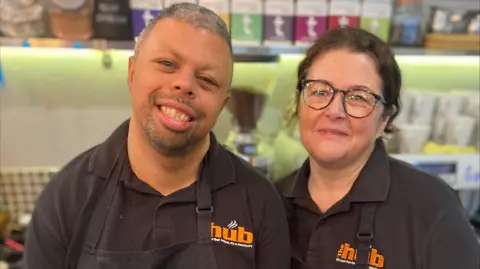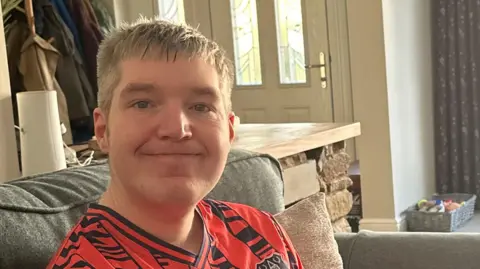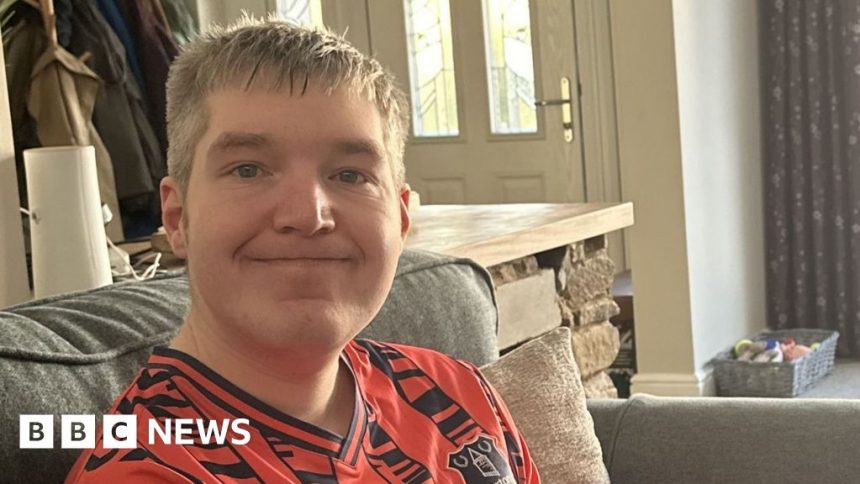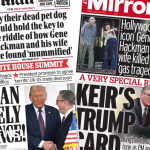Disabled people demand cash access: ‘It makes me feel independent’
 Ann-Marie Kinsman
Ann-Marie KinsmanLeading disability charities have called on the government to ensure that people will continue to be able to use physical cash in shops.
It comes after a government minister said that shops will not be forced to accept cash, despite concerns that millions of vulnerable people rely on it.
Disability Rights UK (DRUK) and the Royal National Institute of Blind People (RNIB) are warning that making card payments the default creates “more barriers” for disabled people.
The BBC has heard from disabled people and their families who fear losing access to cash would limit their independence.
Reece Kinsman, 31, from Manchester, has Williams Syndrome, a rare genetic disorder that is characterised by a neurodevelopmental disability.
He relies on cash to manage his money, as he struggles to track his spending when using a card.
On a recent trip to New Brighton, Merseyside, Reece was left panicked and upset when a fast-food restaurant told him they didn’t accept cash.
“I was disappointed really, I didn’t know what else to do. It was just card, and it’s not easy because I’ve got cash only,” he says.
Luckily his support worker was with him and covered the cost on her card.
 Ann-Marie Kinsman
Ann-Marie KinsmanReece’s mum, Ann-Marie, says handling physical money has given Reece a tangible sense of control over his finances – one that could be threatened if cash is phased out.
“Reece’s level of understanding is around about a six-year-old. We give him cash because it’s better for him to go out in the community and be able to learn how much money is needed to pay for things.”
‘Provide clear guidance’
Last month, Emma Reynolds, the new Economic Secretary to the Treasury, told MPs that shops and service providers would not be required to accept cash. However, she assured the Treasury Committee that the UK would not go fully cashless anytime soon.
But with more than 16 million disabled people in the UK, many relying on cash, charities DRUK and RNIB are urging the government to ensure continued access to cash and banking.
Fazilet Hadi, DRUK’s head of policy, says the government must “step in and provide clear guidance”.
“The last government proposed legislation requiring businesses to accept cash as an alternative, but that didn’t go forward. In the absence of that, new legislation is needed.”
Meanwhile, the RNIB emphasises the importance of offering “a choice of payment options,” including cash, adding “there is no one-size-fits-all solution for blind and partially sighted consumers”.
 Nicola Hickinbotham
Nicola HickinbothamJack Hickinbotham, 29, from Hereford, has autism, epilepsy and severe learning disabilities. He enjoys the sense of confidence that comes with directly handling cash.
“I feel independent and I like speaking to people.”
Hi mum and carer, Nicola, says that without cash, Jack wouldn’t know how much money he had available.
“We were in the flower shop on Saturday and Jack wanted to buy a packet of mini eggs. They were £4.95, so I gave Jack a £5 note and he was able to pay with that.
“That’s a really big thing for Jack and for his learning skills too.”
‘People rely on cash’
Samantha Smith, 53, from Rotherham, is registered blind and says using cash is a necessity, as she has only 2-3% of her vision left and can’t see the numbers on card machines to verify transactions.
“Blind people rely on cash, so this will have an impact on the whole blind community.”
Samantha also worries a cashless society could leave her more vulnerable to scams and theft – something she has already experienced.
“At Christmas two years ago, I went out to pick up a few last presents. I had my handbag and my purse taken off me. I only lost about £10 in cash that was in the purse. I’d be fearful that if they had taken a card, they would have had access to all of my money.”
A Treasury spokesperson said: “Individual businesses can decide which payment methods they accept, but new rules introduced by the Financial Conduct Authority aim to ensure that businesses can deposit cash, helping those who want to keep accepting it.”







